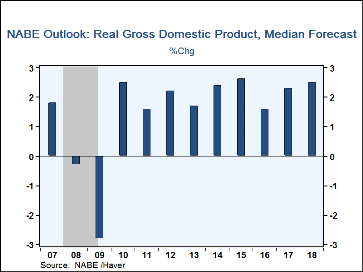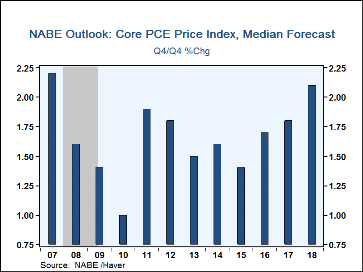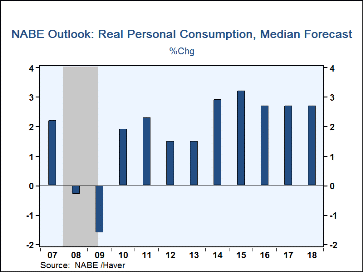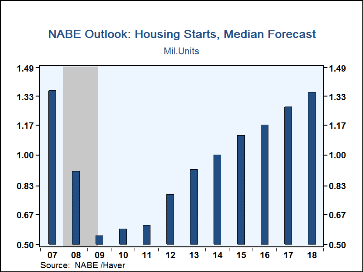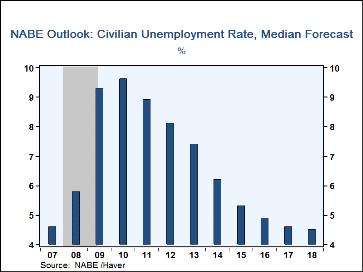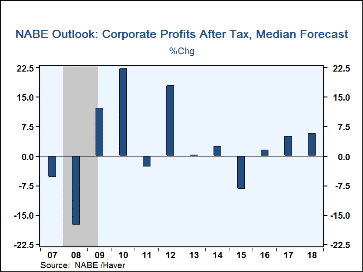 Global| Mar 27 2017
Global| Mar 27 2017NABE 2018 Forecast: Modest Improvement in Economic Growth & Higher Inflation
by:Tom Moeller
|in:Economy in Brief
Summary
The National Association for Business Economics expects 2.5% real U.S. economic growth in 2018 compared to 2.3% forecast for 2017. The gains follow 1.6% growth in 2016 and a 2015 advance of 2.6%. Quarterly GDP growth is expected to [...]
The National Association for Business Economics expects 2.5% real U.S. economic growth in 2018 compared to 2.3% forecast for 2017. The gains follow 1.6% growth in 2016 and a 2015 advance of 2.6%. Quarterly GDP growth is expected to range between 2.4% and 2.6% through next year. Growth in personal consumption expenditures is forecast to remain steady at 2.7%. Expected growth in business fixed investment, however, of 4.4% is the quickest rate of growth since 2014. Residential investment growth also is expected to improve to 5.2% next year after a 4.6% advance in 2017. Government spending growth is projected to improve slightly to 1.4%, the quickest increase since 2015. Deterioration in real net exports is forecast to continue as expected import growth of 4.0% outpaces a 3.0% advance in exports. The rate of inventory investment is expected to improve slightly next year versus 2015, but remain below the gains from 2012 to 2015.
Housing starts are expected to average 1.35 million next year, the strongest level since 2007. Expected light vehicle sales of 17.3 million units in 2018 are slightly lower than the levels of the prior three years, but remain near the all-time high. Average monthly gains in payroll employment are expected to slow to 166,000 next year, down from the 250,000 average in 2014. Expectations for the unemployment rate of 4.5% next year would leave it at the lowest level since 2000.
Consumer price inflation is expected to average 2.3% in 2018 versus 2.4% growth this year. The chain PCE price index, however, should rise 2.1% from the beginning of next year to the end of 2018, the strongest gain since 2011. The index less food & energy is expected to rise 2.1%, up from 1.0% growth in 2010. The cost of crude oil is expected to average $58 per barrel at the end of next year, up from $55 this coming December.
The forecasted 3.25% interest rate on 10-year Treasury notes at the end of 2018 follows a raised 2.82% estimate at the end of this year. The Fed is expected to continue raising the federal funds rate to 2.13% by the end of 2018. Corporate profits after tax next year should rise 5.7%, the quickest rate of growth since 2012. The Federal government budget deficit is expected to be $650 billion in 2018, the largest deficit in five years.
The figures from the latest NABE report can be found in Haver's SURVEYS database.
| National Association For Business Economics | 2018 | 2017 | 2016 | 2015 |
|---|---|---|---|---|
| Real GDP (% Chg. SAAR) | 2.5 | 2.3 | 1.6 | 2.6 |
| Personal Consumption Expenditures | 2.7 | 2.7 | 2.7 | 3.2 |
| Business Fixed Investment | 4.4 | 3.4 | -0.5 | 2.1 |
| Residential Investment | 5.2 | 4.6 | 4.9 | 11.7 |
| Gov't Consumption & Gross Investment | 1.4 | 0.8 | 0.8 | 1.8 |
| Change in Real Business Inventories (Bil. $) | 43.5 | 40.0 | 21.1 | 84.0 |
| Real Net Exports (Bil. $) | -656.0 | -623.0 | -561.5 | -540.0 |
| Housing Starts (Mil. Units) | 1.35 | 1.27 | 1.17 | 1.11 |
| Light Vehicle Sales (Mil. Units) | 17.3 | 17.5 | 17.5 | 17.4 |
| Payroll Employment Average Monthly Change (000s) | 166 | 183 | 187 | 226 |
| Civilian Unemployment Rate (%) | 4.5 | 4.6 | 4.9 | 5.3 |
| Consumer Price Index (Y/Y %) | 2.3 | 2.4 | 1.3 | 0.1 |
| Fed Funds Rate (%, Year-End) | 2.13 | 1.38 | 0.63 | 0.38 |
| 10-Year Treasury Note (%, Year-End) | 3.25 | 2.82 | 2.45 | 2.27 |
Tom Moeller
AuthorMore in Author Profile »Prior to joining Haver Analytics in 2000, Mr. Moeller worked as the Economist at Chancellor Capital Management from 1985 to 1999. There, he developed comprehensive economic forecasts and interpreted economic data for equity and fixed income portfolio managers. Also at Chancellor, Mr. Moeller worked as an equity analyst and was responsible for researching and rating companies in the economically sensitive automobile and housing industries for investment in Chancellor’s equity portfolio. Prior to joining Chancellor, Mr. Moeller was an Economist at Citibank from 1979 to 1984. He also analyzed pricing behavior in the metals industry for the Council on Wage and Price Stability in Washington, D.C. In 1999, Mr. Moeller received the award for most accurate forecast from the Forecasters' Club of New York. From 1990 to 1992 he was President of the New York Association for Business Economists. Mr. Moeller earned an M.B.A. in Finance from Fordham University, where he graduated in 1987. He holds a Bachelor of Arts in Economics from George Washington University.
More Economy in Brief
 Global| Feb 05 2026
Global| Feb 05 2026Charts of the Week: Balanced Policy, Resilient Data and AI Narratives
by:Andrew Cates


